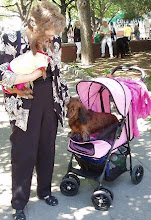I started this blog to share my experiences with handicapped dachshunds; to let people know that handicapped pets can have full and happy lives.
Today, I am coming to my readers for their help with a handicapped pet. A fellow rescuer has just taken in a blind border collie, 11 months old. He was born without eyes. A kind soul took him in, as a pup, so that he would not be euthanized. He was in a rural setting and not integrated into family life. He was surrendered to rescue last weekend.
Family life is brand to to this boy. One of the first challenges is day and night. As he can't see, he has no concept of bedtime vs daytime and is keeping them up all hours of the night. Poor boy is fussing, whining, crying, because all the people have "disappeared".
I have tried searching on blind dogs, and most roads lead back to one or two sites which don't really have much info on this issue. The bulletin board seems to not be very active as well. A post from Sunday has never been answered.
My dad was blind for the last 28 years of his life, so I have had some experience with the challenges of blindness, but Dad had memories of sight to help him, this little BC boy has never seen. I have suggested some Melatonin about an hour before bedtime. As his brain does not get the visual clues of darkness to stimulate the melatonin levels, this may help. Other suggestions have been a small amount of lavender in his bed at bedtime, vigorous evening exercise to tire him out and Tellington Touch massage to help relax him and stimulate night time body chemistry.
Does anyone have any other resources or suggestions?
The family is going to order an Angel Vest for him and we have run through the links from their website. By the way, this boy is not up for adoption. Although Sally is in rescue, this boy is now hers; he is home.
The Hardest Post I've Ever Had To Make
9 months ago

4 comments:
I'll offer what I know...which sadly is little
I would like to say good for you and your friend for the kind heart.
Our first dog lost her vision early on...maybe at 5 yrs. Not suddenly, but as time progressed it faded. Interestingly enough, I don't think it stumped her; she was a tough little pup. But we had to be so careful of things.
1) Don't change routine; build routine She could not tell day from night, but she picked up a routine of activity, sound and smell
2) Don't change furntiure layout
3) Remember a dog is a dog is a dog. Blind, but a dog nevertheless. "Thumper" was a wonderful watch dog. Doorbell ring, knock on door...she would bark and accelerate to the door. But when blind, she would hit a wall, chair leg, and for the first few times until we worked a solution, she really hurt herself. In our case, removed doorbell with a buzzer (she heard buzzers on TV and it never excited her)
I know this is little...but I hope it helps.
Thank you Edward for such a quick response. Yes, it does help. Our heads may know what to do, but our hearts can use the experience and encouragement of others.
Long term, routine is the key. I am hoping to find some short term suggestions as this boy is up and about most of the night and his humans are getting pretty sleep deprived. He has only been with them for 5 "sleeps", of which no one has slept much.
Hopefully he will attach himself to one of the other dogs and take more cues from them as time goes on.
The short term answer may be ear plugs for the humans :-)
http://reboundhounds.blogspot.com/
This blog may be of welcomed info.
Also, scents play an important role in living with a visually impared pet.
Diffferent scents - for different areas. For instance -vanilla oil sprinkled on a mat under the food bowl - signals to the dog - he is at his food station.
Cinnamon scent - spread on stair rails/stair openings - to signal stairs are there.
Use of area rugs is also recommended - and keeping furniture always in the same position.
Hi; I found this page
http://home.gci.net/~divs/assisted/blind_dog.html that has some information and also lists a book called "Living with Blind Dogs" by Caroline Levin that may be useful.
Post a Comment